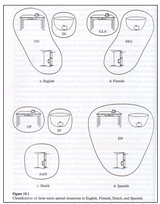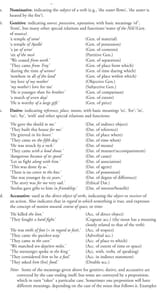>>212237809
>If you were to ask your spouse to "pickup kids" you would be asking them to kidnap, while "pickup the kids" means to take your kids back home
These sort of examples seems deranged for people who grew up with languages without articles because what other kids would you be talking about if not your own?
As if telling someone to "bring over car" results in the other person completely baffled by what car do they need to bring over? Their car that they arrived with or a car that is most convenient to bring over?
But obviously they are necessary for English. Articles are the mechanism by which ambiguity is cleared away, where as in languages without articles you rely on the assumption that the person you are talking to is not a schizo and is formulating sentences within the local context of the situation.
When a wife tells her husband to "pickup kids" the husband understands that the wife hasn't suddenly become a part of a international human trafficking ring asking for the husband to grab the nearest bunch of kids he comes across and instead he needs to drive over to pick up his own actual kids from wherever they are.
The downside of not having "articles", or rather specifically "The", is that you can't really emphasize the important of things the way you can in English.
In English you can just say
>It is the university for medicine
In Latvian saying
>Tā ir universitāte priekš medicīnas
Would be
>It is a university for medicine
So I would have to say something like
>Tā ir labākā universitāte priekš medicīnas
Which becomes
>It is the best university for medicine
Where the use of "The" allows to omit "best" because it is implied by the structure and use of "the".
The closest I can get to "The" use in Latvian would be verbally saying
>Tā IR universitāte priekš medicīnas
by using emphasis on "is", which is kind of similar how English speakers also tent to put emphasis on "IS The", but it doesn't really work.
 6/29/2025, 1:39:02 PM
No.212234141
[Report]
>>212234173
>>212234183
>>212234187
>>212234238
>>212234377
>>212234398
>>212234510
>>212234567
>>212234686
>>212235030
>>212235081
>>212235406
>>212238370
>>212240492
>>212240766
>>212240947
>>212243609
>>212244016
>>212247055
>>212249116
>>212249548
6/29/2025, 1:39:02 PM
No.212234141
[Report]
>>212234173
>>212234183
>>212234187
>>212234238
>>212234377
>>212234398
>>212234510
>>212234567
>>212234686
>>212235030
>>212235081
>>212235406
>>212238370
>>212240492
>>212240766
>>212240947
>>212243609
>>212244016
>>212247055
>>212249116
>>212249548










